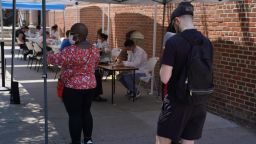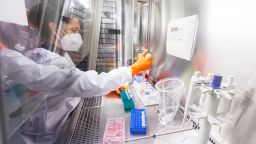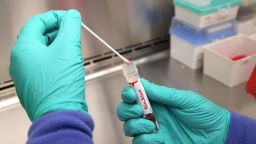New York City’s monkeypox case numbers don’t show the full picture of how bad the outbreak is, and demand for vaccines in the city is outstripping supply, city Health Commissioner Dr. Ashwin Vasan said Tuesday.
When asked on CNN whether he thought the current numbers reflect the full picture, Vasan replied, “I think we can say definitively it’s not. And that’s because only now are we seeing clinical testing starting to ramp up.”
Vasan said officials were encouraged that there are now five commercial labs partnered with the federal government to significantly expand capacity to ensure that doctors can order tests and get results quickly.
“I think we’re going to see cases rise all across this country over the coming weeks as clinical testing increases,” he said.
Vasan described the monkeypox vaccine rollout as “challenging,” saying some of the issues were on the city in terms of technical glitches, “but the really root issue here has been access to vaccine supply. And that’s a national issue.”
While the government is working to get more monkeypox vaccine doses, he said, New York City has nearly 30% of the cases in the country and hasn’t gotten the supply equal to the impact as an epicenter of the outbreak.
“We need to start seeing much more vaccine, and the rest of these things will smooth out as people can get access to the preventive therapies that they want,” Vasan said.
New York is vaccinating people who are at risk of getting or transmitting monkeypox or who are at risk of a severe outcome if they do get the virus, he explained.
“We’re not vaccinating known cases; we’re vaccinating people who are exposed, and so we’re seeing demand for that mostly being really outstripping our supply,” Vasan said, adding that 9,200 vaccination appointments were fully booked seven minutes after they went online Friday.
“We really need much more vaccine. I know that our partners are working hard in Washington and elsewhere, but we need that as soon as possible.”
The prescribing information for the Jynneos monkeypox vaccine recommends two doses given four weeks apart. The US Centers for Disease Control and Prevention says both doses are needed for full protection. But New York officials have decided to focus on giving more people one shot rather than giving a full course to a smaller group, Vasan said.
The best thing for the city is “getting shots in arms as quickly as possible,” Vasan said. That doesn’t mean officials don’t agree that two shots are ideal, “but we are in an environment of increasing cases, extreme demand and extremely constrained supply, and in that environment, it’s incumbent upon us to get shots in arms as quickly as possible because we do believe one shot does confer significant protection, if not as much as two shots.”
Vasan also spoke about the public health messaging from his department around monkeypox, saying it is a “really challenging clinical and epidemiologic question” that’s under debate at the health department, as well nationally and internationally. There needs to be some humility in the fact that although monkeypox has been around for decades, this outbreak is affecting a new population and behaving in new ways, he said.
“I will say very clearly though that gay men, men who have sex with men and the LGBTQ community writ large, have had their sexual practices and behaviors dissected and prescribed and permitted mostly by heterosexual people and policymakers who are heterosexual for decades. And that we have found is, over the years, especially coming out of the HIV movement, really, really damaging and stigmatizing and discriminatory,” Vasan said.
Get CNN Health's weekly newsletter
Sign up here to get The Results Are In with Dr. Sanjay Gupta every Tuesday from the CNN Health team.
“As well, I will say that abstinence as a message doesn’t really work. We know this. It’s not a good public health tool because it’s really about giving people the information to make safe choices but understanding we need to meet them where they are with those choices and give them the information to tell them how monkeypox is transmitted.”



